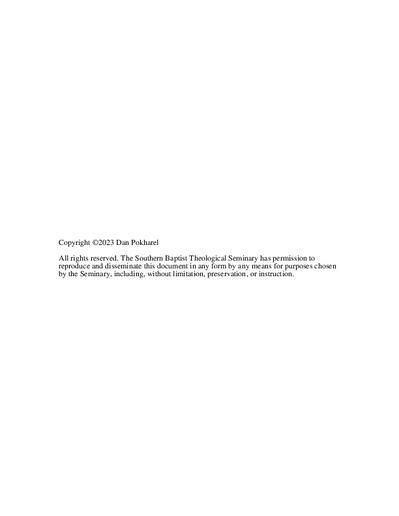| dc.description.abstract | Eastern philosophies, especially Hinduism, are appealing to the Western mind. Hindu adherents can be found in many neighborhoods with Hindu temples in nearby towns and cities. Instead of proclaiming the uncompromised gospel to the world (Rom 1:16), many evangelicals today are gradually accepting and normalizing Hinduism concepts.
Christians are commanded to witness in their Jerusalem, Judea, Samaria, and to the end of the earth” (Acts 1:8). The question for believers is how to witness to Nepalese Hindus. As a former Hindu, I found that Paul’s gospel approach to the pantheistic Athenians (Acts 17:16–34) can be applied to the contemporary pantheistic Hindu context. Like Paul, the gospel workers today must hold to sound doctrine but should also understand their listeners’ context, cultural setting, and belief system in which they intend to present Christ.
The thesis identifies the problem that gospel proclaimers face. In the Nepali context, to witness to Hindus is complicated and confusing. A presenter must understand the basic theological concepts of Christianity and the worldview of Nepalese Hindus. The thesis argues that Paul's emic gospel approach to the Athenians (Acts 17:16-34) should applied in modern Nepali Hindu contexts.
Paul's gospel approaches to Athenians raised curiosity in Athenians' minds. Paul presented his Judeo grounded faith to the Athenians. Paul knew they were idol worshipers. Instead of blaming them, he tells the Athenians, "Men of Athens, I perceive that in every way you are very religious" (Acts 17:22). From there, he bridges his monotheistic view of God.
God has been revealed in the Bible as YHWH and is not the Hindus' Brahman as described in the Vedas, Gita, Upanishads, Mahabharata, the Law Code of Manu, or in the Puranas. The Biblical God is incredibly different from Brahman and Hindu Trimurti— Brahma, Shiva, and Vishnu. Finding the comparative teachings from both traditions helps the gospel presenter equip his beliefs that require at least his basic but essential beliefs and practice and his hearers' basic teaching Essential fundamental Hindu teachings are presented directly from their sacred texts.
Hindus are religious. Their goal is to be free from bad karma and attain moksha. Moksha for Hindus is union with Brahman. Their polytheistic and pantheistic view of god leads them nowhere. To reach a Hindu, an understanding of their monotheistic view of god, their concept of sin, salvation, and the path to moksha are crucial. Hindus need to know that Brahman and YHWH are different deities. The god that the Bible reveals is the Creator, the one true god. | en_US |

